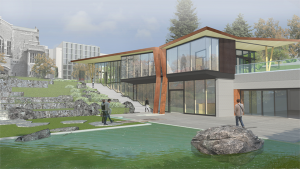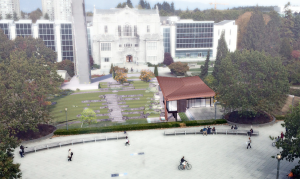September 13, 2016 – The University of British Columbia formally announced yesterday the construction of the Indian Residential School History and Dialogue Centre (IRSC). This $5.5-million building in the heart of campus will recognize the history and experiences of residential school survivors, and memorialize the thousands of Indigenous children who died while in attendance.
VIDEO: Watch the announcement
“While we are thankful for all of the First Nations leadership and UBC leadership that have brought this initiative to reality, the survivors and their families are first and foremost thankful for an accessible place of record,” said Cindy Tom-Lindley, a former residential school student at Kamloops Indian Residential School and executive director of the Indian Residential School Survivor Society (IRSSS).
Scheduled for completion in the 2017-18 academic year, IRSC will provide former students and their families with access to the records of the Truth and Reconciliation Commission of Canada, and give students and visitors ways to understand the history and lasting effects of Indian residential schools as a context for thinking about contemporary relationships. Advanced use of interactive media will give visitors the opportunity to explore extensive records and testimony and form their own understandings. The centre will also serve as a hub for academic and community research, education and public programming.
“The centre will provide the UBC community an opportunity for greater reflection on a difficult chapter in Canadian history,” said UBC President Santa Ono. “Recognition of our past is of critical importance to UBC and to all Canadians in planning our future. The centre will help us to collectively rethink the relationship between Indigenous and non-Indigenous peoples in this country.”
An affiliate site to the National Research Centre for Truth and Reconciliation in Winnipeg, IRSC will particularly focus on the experiences of Indigenous peoples in B.C., where many of the schools were located, and will provide local access to records for survivors and their families on the West Coast.
“An important function of this centre is to acknowledge the lives and histories of Indigenous peoples in Canada,” said Linc Kesler, director of the UBC First Nations House of Learning. “Through both policy and inaction, the circumstances of Indigenous peoples have often been invisible in all but the most superficial ways. It is a responsibility of the university and the educational system as a whole to change that and provide the basis for more informed interactions.”
Canada’s Indian residential school system started in the 1800s. The government-sponsored system forced an estimated 150,000 Indigenous children out of their homes and into strict religious boarding schools. Many were physically and sexually abused, and some were used as test subjects in nutritional and other forms of experimentation. An estimated 6,000 children died while in attendance. The last residential school closed in 1996 in Saskatchewan.
Background
When complete, IRSC will be a donor-funded, two-storey building covering approximately 6,500 square feet, located between Koerner Library and the Irving K. Barber Learning Centre.
IRSC is developed in collaboration with Indian Residential School Survivor Society and in consultation with the Truth and Reconciliation Commission of Canada.
RELATED: Indian Residential School History and Dialogue Centre
Additional quotes
Senator Murray Sinclair, Former Chair, The Truth and Reconciliation Commission of Canada:
“I congratulate the University, it’s Board of Governors, President Ono and university staff for this initiative. I am sure it will go far to ensuring that Canada’s national memory about this history is complete and remains intact for future generations. Canada’s academic community has a unique responsibility to reveal past wrongs and challenge historical myths and exclusions while at the same time contributing to the process of addressing the question of what to do about them. Reconciliation is all about answering that challenge in a manner that contributes to a meaningful and mutually respectful relationship between all Canadians including the original peoples of this territory. UBC has shown leadership nationally in undertaking to create this Centre. Please be assured of my ongoing support for the Centre and of my view that in doing this, UBC has taken a major step in fulfilling the Truth and Reconciliation Commission’s Calls to Action.”
Ry Moran, Executive Director, National Research Centre for Truth and Reconciliation:
“The development of the centre at UBC further helps realize the vision of a national network of interconnected partners working together for truth and reconciliation. Many years in the making, we are thrilled to see UBC take such an important step forward today and look forward to moving ahead together.”
DeDe DeRose, Member of UBC President’s Advisory Committee on Aboriginal Affairs:
“I am honoured to witness today’s historical announcement. By creating the Indian Residential School History and Dialogue Centre, UBC ensures that Justice Sinclair’s recommendation in the Truth and Reconciliation Report is achieved. The centre provides a place to house the history about the devastating impact that residential schools had on Aboriginal peoples that has been hidden from Canadians for generations. My mother, Cecilia (Dick) DeRose’s, 1950-51 residential school report card will be housed in this landmark centre along with other memorabilia. This centre will provide an important learning opportunity to all Canadians.”
Grand Chief Edward John, First Nations Summit:
“We commend UBC for its work to establish the Indian Residential School History and Dialogue Centre. It will not only be an important resource for residential school survivors, it will also play an important role in the path of reconciliation by helping to preserve the history, and to tell the stories, of this very dark time in Canadian history. Reconciliation in Canada can only be achieved by acknowledging our collective history. It is critical to continue to provide opportunities for Canadians to be educated on the residential school system in Canada and the deep negative impacts on Indigenous peoples and communities across this country.”
Sheryl Lightfoot, UBC Assistant Professor, First Nations and Indigenous Studies and Political Science:
“The twin issues of reconciliation and re-setting relationships between Indigenous and non-Indigenous peoples are truly global in scope, as forced residential schooling not only happened here in Canada but in other countries as well, including the United States, and so the legacies of this history are far-reaching as well. I am happy to see UBC host this centre, which will play an important role in public education and dialogue, with the hope of more just and respectful relationships in the future. I look forward to the opportunity to bring my students to this centre and actively engage them in these critical conversations.”
Sarah Hunt, UBC Assistant Professor, First Nations and Indigenous Studies and Geography:
“The Dialogue Centre will provide a necessary space to foster ongoing engagement with the stories so bravely and generously shared by residential school survivors. In this way, it honors the survivors by allowing new generations of visitors to witness their experiences and, hopefully, to better understand the impact of colonization on Indigenous peoples. The harmful legacy of residential school policies is still very much alive in today’s child welfare systems. I hope this centre will help to wake people up to the dehumanizing effects of these policies, such that we can change conditions for future generations of Indigenous children and youth. The strength of this centre lies not only in its future use but also in its creation as a collaborative effort between UBC and IRSSS, as well as the Musqueam peoples who host us everyday on this campus. The strength of these relationships will undoubtedly provide significant direction to those who run the centre.”
Adina Williams, Canadian Roots Exchange Youth Reconciliation Leader & UBC Aboriginal Student:
“As a young intergenerational survivor of the Indian residential school system, I’ve spent much of my life either observing the many effects that seven years of residential school has had on my adopted dad, or directly experiencing the various challenges that come with a large gap that still exists between Indigenous and non-Indigenous peoples, especially regarding this chapter in our history. As an Aboriginal student at UBC, I am excited that we will soon have a highly accessible centre where survivors and their families are able to share their stories and continue to heal, and I look forward to all the learning and conversations that will take place in the centre, for they will surely help many more people better understand the true stories of our past. I am hopeful that this can ultimately help us all move forward into a new chapter.”
Aboriginal engagement at UBC
UBC has a long-standing commitment to Aboriginal engagement, a key component of “Place and Promise”, the university’s strategic plan.
UBC has a number of programs and courses with an Aboriginal focus, including Canada’s oldest Aboriginal law program, an Indigenous teacher education program, an Aboriginal residency program for medical students, the First Nations Languages program, and the interdisciplinary First Nations and Indigenous Studies program. As well, a number of resources and initiatives at UBC focus on furthering the understandings of Indigenous cultures and histories into its curriculum and operations.
UBC recognizes its Vancouver and Kelowna campuses are situated on the traditional, ancestral and unceded territories of the Musqueam Indian Band and the Okanagan First Nation.
Source: UBC to house Western Canada’s first residential school history centre with files from FNHL staff.


Comments are closed, but trackbacks and pingbacks are open.